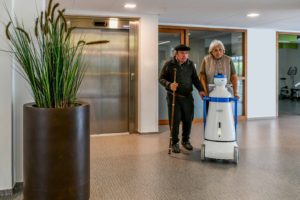 Believe it or not, there IS news beyond a virus!
Believe it or not, there IS news beyond a virus!
France’s Kompaï assistance robot is finally for sale to health organizations, primarily nursing homes and hospitals. Its objective, according to its announcement release, is to help health professionals in repetitive daily tasks, and to help patients. It’s interesting that the discussion of appearance was to achieve a ‘slightly humanoid’ look, but not too human. The development process took over 10 years. (Here at TTA, Steve’s first ‘in person’ with the developers was in May 2011!) Kompaï usage mentioned is in mobility assistance and facility ‘tours’ and public guidance. Here’s Kompai in action on what looks like a tour. Press release (French/English)
Not much on robotics here. Laurie Orlov has issued her 2020 Market Overview Technology for Aging Market Overview on her Aging and Health Technology Watch, and everyone in the industry should download. Key points:
- In 2020, aging technologies finally nudged into the mainstream
- The older adult tech market has been recognized as an opportunity by such companies as Best Buy, Samsung, and Amazon. Medicare Advantage payers now cover some tech.
- Advances plus smart marketing in hearing tech–one of the top needs in even younger demographics–is disrupting a formerly staid (and expensive)
- The White House report “Emerging Technologies to Support an Aging Population” [TTA 7 March] first was an acknowledgment of its importance and two, would also serve as a great source document for entrepreneurs and developers.
The study covers the demographics of the older adult market, where they are living, caregiving, the effect of data breaches, optimizing design for this market, the impacts of voice-driven assistants, wearables, and hearables.
Project Nightingale may be singing to some US Senators. The 10 million Ascension Health identified patient records that were transferred in a BAA deal to Google [TTA 14 Nov 19], intended to build a search engine for Ascension’s EHR, continue to be looked into. They went to Google without patient or physician consent or knowledge, with major questions around its security and who had access to the data. A bipartisan group of senators is (finally) looking at this ‘maybe breach’, according to Becker’s. (Also WSJ, paywalled)
Short takes: b.well scored a $16 million Series A for its software that integrates digital health applications for payers, providers, and employers. The round was led by UnityPoint Health Ventures….Lyft is partnering with Unite Us to provide non-emergency patient transportation to referred health appointments. Unite Us is a social determinants of health (SDOH) company which connects health and community-based social care providers….What happens if you’re a quarantined physician due to exposure to the COVID-19 virus? Use telehealth to connect to patients in EDs or in direct clinic or practice care, freeing up other doctors for hands-on care. 11 March New England Journal of Medicine….American Well is finally no more, long live Amwell. Complete with a little heart-check logo, American Well completed its long journey to a new name, to absolutely no one’s surprise. It was set to be a big reveal at HIMSS, but we know what happened there. Amwell blog, accompanied with the usual long-winded ‘marketing’ rationale They are also reporting a 10 to 20 percent increase in telehealth consults by patients (Becker’s)….Hospitals and health systems such as Spectrum Health (MI), Indiana University Health, Mount Sinai NY, St. Lukes in Bethlehem PA, and MUSC Health, are experimenting with COVID-19 virtual screenings and developing COVID-19 databases in their EHRs. The oddest: Hartford (CT) Healthcare’s drive-through screening center and virtual visit program. Is there an opportunity to cross-market with Wendy’s or Mickey D’s? After all, a burger and fries would be nice for a hungry, maybe sick, patient before they self-quarantine.







Most Recent Comments